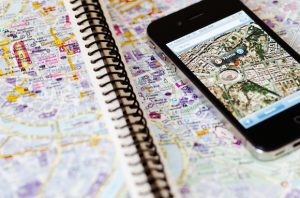If you travel to get away from it all, maybe you don't even use your mobile phone on vacation, except to take selfies and occasionally find your way when lost in a strange city. But if you travel for business, you can't do without it. As we all become increasingly tethered to, and dependent on, our smartphones, doing without one is akin to marooning on a desert island. The only problem: roaming abroad on your mobile can be expensive, especially when using the data-hog that is Google maps or if downloading images or movies.
Here are five strategies for keeping costs down, but staying connected, just as you do at home:
1. T-Mobile
Perhaps the biggest change in mobile last year was T-Mobile offering free unlimited (albeit quite slow) data, and texting along with 20 cent per minute phone calls in over 100 countries, with its Simple Choice bundle. True, T-Mobile has had a bad rep in the past for spotty service in the U.S., but things have improved and their monthly rates are highly competitive.
Pros:
- You keep your number (which means people can find you almost anywhere in the world, but may also wake you up at 3 a.m. in Abu Dhabi).
- Other than the 20 cent per minute phone calls, you pay nothing extra.
Cons:
- Data is limited to 3G speeds, which can be slower than what you experience at home (4G, LTE).
- You need to switch to T-Mobile if you don't already have it.
2. Data plans with ATT, Sprint, Verizon
This is the easiest option if you don't have T-Mobile and have no intention of switching. Your current service provider offers data plans with bundles of minutes, texts, and data, but these aren't exactly cheap. With ATT phones on a contract, for example, using their three "Passport" options, you'll pay between $30 per month for 120 megabytes (MB) of data up to $120 for 800 MB; additional megabytes are priced at varying levels. Phone calls range from $1.00 to 35 cents per minute and messages are free. Costs are considerably higher for pay-as-you-go plans.
Pros:
- You keep your number
- No need to unlock your phone
Cons:
- Perhaps the most expensive option, especially if you go over your data allocation or make a lot of calls.
- Verizon and Sprint phones use "CDMA" technology (ATT and T-Mobile are "GSM" providers) and don't work in many foreign countries.
3. Unlock, get a local SIM
Before T-Mobile changed the game, this was the favorite method for international road warriors. It works like this: make sure your phone is "unlocked" (your provider should allow this subject to its terms and conditions, or buy an unlocked phone); when you arrive in a foreign country seek out phone shops or kiosks selling local SIM cards with local phone numbers; insert card and you're set to go.
Pros:
- You get a local number
- Rates are cheaper than buying a data plan
Cons:
- You must buy a SIM card for each country you visit
- You must have an unlocked phone, which can sometimes be a tedious process
4. Buy a cheap pay as you go phone
If you travel to a particular country often, another option is to buy a cheap phone in that destination. If you're only making phone calls, some phones can cost as little as $20 (not smartphones however). You buy a bundle of minutes or data and top up the phone when you run out.
Pros:
- You get a local number so local calls are cheap and local callers can call you for less
- No unlocking hassle
- Can be cheaper than a data plan from your current provider.
Cons:
- Per minute and per megabyte costs are relatively pricey compared to other options
- May not be cost effective if you're buying an expensive smartphone
5. Buy an international SIM card before you leave home
Several companies let you buy an international SIM card with pre-paid service before you leave the U.S. Among them: MaxRoam, Telestial, and TruPhone. These services will generally be cheaper than buying a data plan from your current phone service
Pros:
- Data speeds will be faster than T-Mobile's slow 3G.
- Per call and per MB costs are lower than buying a data package from ATT, etc.
- One SIM card works in multiple countries
- Incoming local calls are often free
Cons:
- Still not cheaper than free, unlimited T-Mobile data
- You don't get to use your current phone number.
And, of course, you can just use WiFi when you travel abroad. Most restaurants, cafes, hotels and other venues offer it, and there's always Boingo and other hotspots, although that means you have to be near a hotspot and navigating with real-time maps is impossible. Or just leave your phone at home. Unplug and enjoy the scenery.






